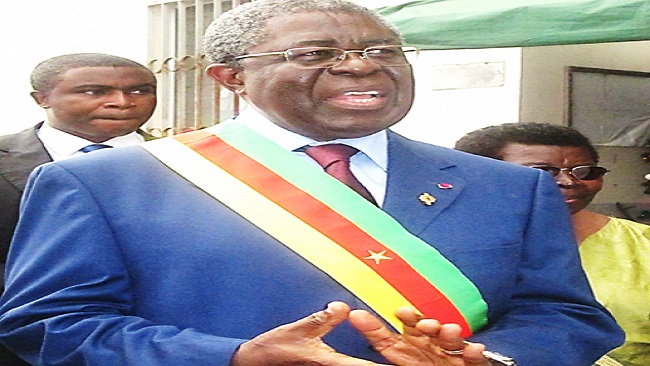Promotion of Bilingualism and Multiculturalism: Can Musonge unite the two Cameroons?
Created with great pomp in 2017 and presented as a solution to the socio-political crisis shaking Cameroon, the ‘Commission pour la Promotion du Bilinguisme et du Multiculturalisme’ [Committee for the Promotion of Bilingualism and Multiculturalism] is struggling to bring a deeply divided country together.
Peter Mafany Musonge slowly made his way to the Yaounde Convention Centre. On 21 January, the former prime minister of Cameroon attended a meeting there along with the other 14 members of the Commission pour la promotion du bilinguisme et du multiculturalisme [National Committee for the Promotion of Bilingualism and Multiculturalism] (CNPBM), an institution he has headed since its creation in 2017.
As he settled into meeting room “A”, where the biannual session took place, Musonge was aware that his citizens have a long list of demands. Especially since, for the year 2021 alone, its budget amounts to about 3bn CFA francs (€4.5m) – a substantial budget in a context of crisis, in which resources are scarce. The adoption of this package is, moreover, the main item on the agenda.
“This budget will allow us to carry out our three main programmes,” said Musonge in a brief statement to the media at the end of the session. “The programme on bilingualism, which is to be extended and implemented throughout the country, the programme on multiculturalism and living together and, finally, the one on governance and institutional support.”
“No effects on the ground”
A plan of action that should give a boost to activities in the field and silence criticism. There are indeed prominent public voices denouncing the organisation’s wait-and-see approach, given the fact that the social climate is deteriorating as the days go by. The events that occurred during the 2018 presidential election were a continuation of the problems that have affected the country since the Anglophone crisis began in 2016.
Musonge himself acknowledges a resurgence of “intra-community stigmatisation.” “In the political field, frightening expressions such as ‘supremacists’ or ‘ethno-fascists’ are used to label certain individuals or groups […] On the economic front, odious rhetoric is directed against certain tribes that are depicted as ‘land thieves’ and ‘invaders.’ This worrying phenomenon can lead to uncontrollable acts of violence,” he said in a forum at the end of 2020.
Civility
Presented three years ago as the solution to these divisions, the CNPBM is struggling to break a cycle that has plunged the country into a climate of anxiety and where violence is ongoing. “We don’t feel the effects of this committee on the ground,” says Peter O., a resident of Yaoundé. “Since its members were installed, hate speech between communities has increased. Even the Anglophone crisis, which was at the origin of its creation, is still ongoing.”
No reforms, no sanctions
The controversy over the purchase of company cars, which tainted the institution in August 2018, is still fresh in many people’s minds. The revelations surrounding a public contract of 700m CFA francs – awarded by mutual agreement and intended for the purchase of 15 Toyota Prado V8 vehicles for members of the committee – had shocked public opinion.
However, according to several observers, the committee’s apparent inertia is above all due to its structure and prerogatives. “It is difficult to expect anything from such a consultative body. Resolving the socio-political crises that undermine the country is a matter of governance, but this commission does not have the power to implement reforms,” says Franck Essi, a consultant for the think tank Strategies Consulting Firm.
“Its members took part in the major national dialogue [held in early October 2019], but they had no decisive role in organising and facilitating discussions. Nor does the commission have the means to track down and punish the abuses observed in society.”
Criticism that CNPBM members reject, highlighting their contribution to the adoption of laws promoting official languages and on hate speech. “The committee is not in hibernation,” said Musonge. “We are doing conceptual work for the head of state. Sanctions are not a priority for the committee” said George Ngwane, one of its members. “The important thing is to push people to adopt good practices.”
Will this be enough? Only time will tell.
Culled from Africa Report





